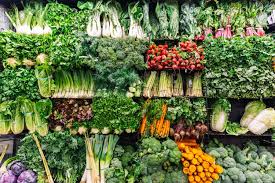Unlocking the Power of Fresh Produce for a Healthier You

The Importance of Fresh Produce in a Healthy Diet
Eating a diet rich in fresh produce is essential for maintaining good health and well-being. Fruits and vegetables are packed with essential vitamins, minerals, and antioxidants that support various bodily functions and help prevent chronic diseases.
One of the key benefits of consuming fresh produce is the high fibre content found in fruits, vegetables, legumes, and whole grains. Fibre is crucial for digestive health as it aids in proper digestion and helps prevent constipation. Additionally, a diet high in fibre can lower the risk of developing conditions such as heart disease, diabetes, and certain types of cancer.
Furthermore, fresh produce is low in calories and fat but high in nutrients, making it an excellent choice for weight management. By incorporating a variety of fruits and vegetables into your meals, you can feel full and satisfied while consuming fewer calories compared to processed or high-fat foods.
In addition to their nutritional benefits, fresh produce adds flavour, colour, and texture to meals, making them more enjoyable and appealing. Whether raw or cooked, fruits and vegetables can be incorporated into a wide range of dishes to create delicious and nutritious meals for the whole family.
It is important to choose a variety of fresh produce to ensure you are getting a diverse range of nutrients. Aim to include different colours of fruits and vegetables in your diet as each colour represents unique vitamins and antioxidants that contribute to overall health.
In conclusion, fresh produce plays a vital role in promoting good health and preventing disease. By making fruits and vegetables a central part of your diet, you can nourish your body with essential nutrients while enjoying delicious meals that support your overall well-being.
Five Essential Tips for Selecting and Storing Fresh Produce
- Choose fruits and vegetables that are in season for better flavour and freshness.
- Inspect produce for any bruises, cuts, or mould before purchasing to ensure quality.
- Store fruits like bananas and apples separately as they release gases that can cause other produce to ripen faster.
- Wash all fruits and vegetables thoroughly before consuming to remove dirt, bacteria, and pesticides.
- Consider buying organic produce to reduce exposure to synthetic pesticides and chemicals.
Choose fruits and vegetables that are in season for better flavour and freshness.
Selecting fruits and vegetables that are in season is a wise choice for enhancing both flavour and freshness in your meals. Seasonal produce is typically harvested at its peak, ensuring optimal taste and texture. By choosing fruits and vegetables that are in season, you not only enjoy a more vibrant and delicious eating experience but also support local farmers and reduce the environmental impact of food transportation. Embracing seasonal produce is a simple yet effective way to savour the best that nature has to offer while reaping the nutritional benefits of fresh, locally sourced ingredients.
Inspect produce for any bruises, cuts, or mould before purchasing to ensure quality.
When selecting produce, it is important to carefully inspect each item for any signs of damage such as bruises, cuts, or mould. By checking the quality of the produce before purchasing, you can ensure that you are selecting the freshest and most nutritious options available. Avoiding damaged or spoiled produce not only guarantees better taste and texture but also reduces the risk of consuming harmful bacteria or contaminants. Take the time to examine each piece carefully to make informed choices that contribute to a healthy and enjoyable eating experience.
Store fruits like bananas and apples separately as they release gases that can cause other produce to ripen faster.
To prolong the freshness of your produce, it is advisable to store fruits such as bananas and apples separately from other items. Bananas and apples release ethylene gas as they ripen, which can accelerate the ripening process of nearby fruits and vegetables. By keeping these ethylene-producing fruits in a separate storage area, you can help maintain the quality and shelf life of your produce for longer periods.
Wash all fruits and vegetables thoroughly before consuming to remove dirt, bacteria, and pesticides.
It is essential to wash all fruits and vegetables thoroughly before consuming them to eliminate any dirt, bacteria, or pesticides that may be present on the surface. By washing produce under running water and using a brush or cloth to scrub firm-skinned items, you can reduce the risk of foodborne illnesses and minimize exposure to harmful chemicals. Taking this simple step helps ensure that you enjoy fresh produce that is clean, safe, and free from contaminants, promoting better health and well-being.
Consider buying organic produce to reduce exposure to synthetic pesticides and chemicals.
When choosing produce, it is beneficial to consider purchasing organic options to minimise exposure to synthetic pesticides and chemicals. Organic produce is grown without the use of synthetic pesticides, herbicides, or fertilisers, reducing the risk of consuming harmful residues. By opting for organic fruits and vegetables, you can support sustainable farming practices and prioritise your health by enjoying produce that is free from potentially harmful chemicals.
